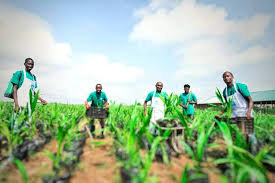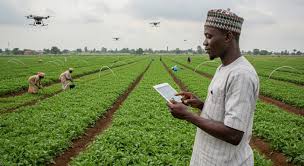Young farmers in the Niger Delta region appear to be ready to harvest the available opportunities in fishery, poultry, oil palm, rice, plantain, and cassava production to earn a living. The Federal Government and the International Fund for Agricultural Development (IFAD) developed the LIFE-ND programme in 2019 to promote income-generating enterprises in the agribusiness value chain for youth and women, including people living with disabilities, in the Niger Delta.
The project targets 38,250 beneficiaries in the nine Niger Delta states: Abia, Akwa Ibom, Bayelsa, Cross River, Delta, Edo, Imo, Ondo, and Rivers, with the Niger Delta Development Commission (NDDC) providing counterpart funds for beneficiaries from Akwa Ibom, Imo, and Rivers states, the implementation team’s assessment reports from these states indicate positive impacts on the beneficiaries. Some of the youth who enrolled as “incubatees” in the project in Akwa Ibom, Imo, and Rivers said they have acquired good skills in how to produce, process, and market their products profitably along the selected value chains for the programme.
Officials from the project and the NDDC observed that some young farmers, who are ‘mentees’ in well-established farms under mentorship, are learning greatly. According to Bassey Eteyit, an “incubator” and General Manager of Eteyit Farms in the Essien Udim area of Akwa Ibom State, there are 10 youths under his farm. He noted, “As they are now, they have fair knowledge of fish production and can process fish for marketing. It is a project I believe is quite laudable and sustainable”. One of the incubatees, Utibe Alexander, said the project has helped immensely. “I came here with no knowledge and anything, but I now know how to rear fish and even process them for marketing”, he stated.

The project inspection team to Imo State, which was led by a Deputy Director of Agriculture and Fisheries, Wale Oretan, commended the incubator and the ‘incubatees’ of cassava and aquaculture at Nnebukwu town in Izombe, Imo State. The ‘incubatees’ of aquaculture and its value chain under Uchegbu Chijioke (incubator) expressed their happiness with the enterprise and its value chain, now that they have been exposed to it and have learned so much. “We have now discovered ourselves and can stand on our own. We can now do direct and indirect fish marketing businesses, as well as handle digitalized fish marketing businesses”, he said.
In a related development, a female farmer, Grace Oke, who has developed a deep passion for the mushroom business, is nurturing her new venture into profitable cultivation. Oke has left Nasarawa State, where she faced numerous unsuccessful attempts to break even, to establish two thriving mushroom farms – one in Ogbomoso, Oyo State, and another in Kuje, near Abuja. Oke began cultivating mushrooms in her backyard and has since expanded it into a multi-branch business. “We acquired a larger land, and we plan to sink boreholes, erect fences, and hire more workers. People in the eastern part of the country are more familiar with mushrooms. So, we believe expanding there will bring more awareness and demand. The mushroom business is very lucrative. When I say very lucrative, it’s very lucrative”, she emphasised.
Oke currently charges N4,000 for a kilogramme of fresh oyster mushrooms and N20,000 for dried ones. She buys 500 grammes of mushroom “spawn” (the seed) for N3,000 from the western region of Nigeria. I’ve managed to make 2,000 bags. Fruits can be stored in the bags for three to four months before becoming bad”, she said. The female farmer said she had seen a steady increase in her clientele and demand for mushrooms from eateries, individuals, and even pharmaceutical businesses, noting that she now sells both dried and fresh mushrooms at the same time.
Oke became interested in mushrooms because they do not require a lot of space or money to start. In contrast to many agricultural endeavours that necessitate loans, grants and substantial initial capital, mushroom farming can be initiated with as little as 50,000 to 100,000. “Mushrooms are grown indoors without sunlight. They don’t go through photosynthesis. What they need is moisture, cleanliness and ventilation,” she explained. Using materials like rice bran, sawdust and water, we water them twice daily, and they can be ready for harvest within one to two months. It doesn’t need much training and learning, and it doesn’t take a very long time before it starts yielding or harvesting and making a gain.
“I went into mushroom cultivation because of the health benefits. It’s something many people overlook when they think of farming; it doesn’t really come to people’s minds in Nigeria, unlike other countries that are very much into the production of mushrooms and the exporting and importing of the product. But mushrooms are nutritious, organic, and in high demand both locally and internationally”, she added. However, Oke noted that mushroom farmers are often excluded from grants, loans and support programmes because “When the government talks about agriculture, they focus on poultry, maize and cassava, forgetting the mushroom farmers. One major challenge that I face is inadequate access to quality spawns, which are the seeds of the mushroom. I get the seeds from the West, from places like Lagos and Ibadan. Also, the lack of mechanisation slows down production, while unreliable power supply hinders storage and preservation. If you also want to export, you will need a (registered) number, which is not easily accessible”, Oke stated further.

